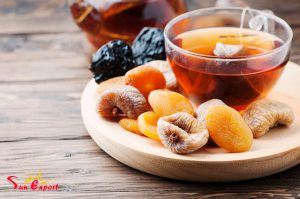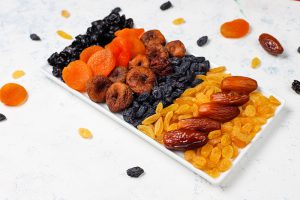Dried fruit is obtained from a process that takes the water out of the fruits. This process keeps the rest of the fruit healthy, so the rest is high in nutrients and can still be delicious. Dried fruit is a light snack. Many nutritionists believe that dried fruits are a nutritious and appropriate choice as long as we consume them in moderation. New research has shown that eating dried fruits is associated with a healthy diet and reduced obesity.
Of course, fresh and unprocessed fruit is always the best choice, but when it comes to choosing between dried fruits and fruit juices or not eating fruit, the best choice can be dried fruits.
pros and cons of Dried Fruits
pros
- Rich in fiber
- Contains antioxidants
- Contains a lot of nutrients
- They are easy to store, move, and eat.
Fiber
Dried fruits have as much fiber as fresh fruits. Fiber boosts good health in different ways. Some examples of these:
- Improve intestinal health
- Lowering Cholesterol
- Help control blood sugar
- Help stabilize weight
- Health or improve weight loss
Antioxidants
Antioxidants protect cells against free radicals, which can cause heart disease, cancer, and other diseases. Research has shown that dried fruits have many antioxidants like fresh fruits.
Nutrients
In addition to fiber, dried fruits contain high levels of vitamins and nutrients that are essential for a healthy diet. Depending on the type of fruit you eat, these nutrients include:
- Vitamin A
- Vitamin K
- potassium
- Iron
- Magnesium
Dried fruits have a long shelf life, and you can use as a snack and also, can move them in your bag comfortably. It is difficult to take an apple or pineapple in your bag, but after drying a packet of the same fruit, you can carry them so easier everywhere. When you consume dried fruit, you don’t need to worry about spoiling or reducing its benefits.
Article about Dried fruits and Iron
Cons
- sugar and calories
- Added sugar and preservatives
- Not as healthy as fresh fruits.
One serving of dried fruits is high in calories. For example, a cup of blueberries has about 85 calories, while a cup of dried blueberries has about 500 calories. If you want to use dried fruits, you should pay attention to the amount. You can mix dried fruits with other healthy foods such as nuts to balance calories.
Added sugar and preservatives
Some packages of dried fruits that you buy in stores may contain added sugar. Excess sugar can lead to overweight, increase the risk of diabetes, and other health problems. Sulfites often used to preserve dried fruits, have been linked to asthma, and migraine attacks.
A less healthy choice!
We cannot say that dried fruits can be a permanent substitute for fresh fruits. The fiber in fresh fruits has more properties and water. In some cases, nutrients remove during the fruit drying process. Therefore, the piece of fresh fruit will be more useful for your digestive system.
Weight loss with dried fruits
Losing weight requires controlling daily calories in a healthy diet and also regular exercise. Increasing your body’s metabolism can help you lose weight. This process will complete by eating foods that will feel fuller for longer. One thing that keeps you full for a long time is dried fruits. Some Dried fruits are useful and nutritious and also help you lose weight, such as dates, dried apricots, and prunes.
Many of these dried fruits make your snacks delicious, especially if you eat them in the appropriate amount. Dried figs and dates are recommended because of their high fiber content. Dates, although high in sugar, are a good substitute for sugar and honey in smoothies.

Some simple tips for using dried fruits
Mix dried fruits with nuts.
Take dried fruit with you on trips and picnics, because carrying them is easy, and you do not have to worry about spoiling.
Add some dried fruit to your breakfast cereal, or yogurt to benefit their properties.
Use dried fruits in salads or with some foods, such as dates that can be stuffed with cheese and serve as finger food.
What are the best-dried fruits?
| 1/4 cup
serving |
Calories | Carbs
(g) |
Fiber (g) | Sugars (g) | Protein (g) | Calcium (mg) | Potassium (mg) |
| Apples(6 rings) | 90 | 25 | 3 | 21 | 0 | 0 | — |
| Apricots(8-9) | 78 | 20.4 | 2.4 | 17.4 | 1.1 | 17.9 | 377.7 |
| Banana(30g) | 100 | 25 | 2 | 16 | 1 | 0 | — |
| Blueberries | 150 | 35 | 5 | 21 | .5 | 40 | 300 |
| Cherries | 140 | 36 | 3 | 31 | 1 | 0 | 350 |
| Cranberries | 105 | 26.3 | 1.5 | 21.8 | 0 | 0 | 18.8 |
| Dates(2) | 133 | 36 | 3.2 | 31.9 | .9 | 30.7 | 334.1 |
| Figs(4) | 140 | 28 | 5 | 21 | 1 | 60 | 260 |
| Mango(6) | 130 | 30 | 2 | 26 | 1 | 0 | 190 |
| Peaches(30g) | 90 | 23 | 3 | 20 | 1 | 0 | — |
| Pears(2 halves) | 92 | 24.4 | 2.6 | 21.8 | .7 | 11.9 | 186.6 |
| Pineapple(2 rings) | 130 | 30 | 2 | 27 | 1 | 40 | — |
| Prunes
(4 dried plums) |
100 | 24 | 3 | 12 | 1 | 20 | 290 |
| Raisins | 108 | 28.7 | 1.3 | 21.5 | 1.1 | 18.1 | 271.5 |
| Strawberries(30g) | 111 | 25.3 | 4.1 | 15.2 | 1 | 40.5 | — |
| Reference: https://www.calorieking.com/ | |||||||
Summary
SunExport is a reliable company in the international community. SunExport has a long history of exporting dried fruits, nuts, many types of Iranian dates, and dates products. We are trying to maintain our brand by exporting the best quality of our products. For more information, please contact us.

